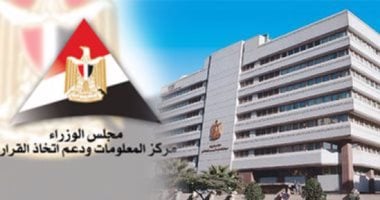"معلومات الوزراء" يطلق العدد الثامن من إصدارته الدورية آفاق صناعية

The Information and Decision Support Center of the Council of Ministers issued the eighth issue of its periodical magazine “Industrial Horizons” under the title “Pharmaceutical Industries,” which reviewed many opinion articles by a group of experts, academics and specialists, shedding light on the topic of the issue, with the aim of strengthening research and development mechanisms in the field. The pharmaceutical industry, including articles on the trends and prospects of the global pharmaceutical industry with a focus on the Chinese experience, the field of the pharmaceutical industry in India, and intellectual property in the pharmaceutical industries. The magazine also included research presentations on some issues and topics related to “Pharmaceutical industries”, and monitoring of many international experiences related to the issue’s topic.
Among the opinion articles included in the issue is an article entitled “The Development of the Global Pharmaceutical Industry from Herbs to Modern Medicines” by Dr. Aya Suleiman, Pharmacist – Technical Secretariat of the Medical Advisory Council of the Public Authority for Health Care. The article explained that the pharmaceutical industry is an essential engine for economic growth, as it is one of the largest sources of Generating wealth in the world contributes significantly to the gross domestic product of countries, as the value of the global pharmaceutical market is estimated at trillions of dollars. The market has witnessed significant growth over the past two decades and the total pharmaceutical revenues around the world have reached 1.4 trillion US dollars. In 2022, it is expected to grow to $1.8 trillion by 2026. On the other hand, the global pharmaceutical industry is a strong foundation for generating millions of job opportunities, starting from the research and development departments, then manufacturing, then marketing and distribution, until after-sales research.
Relatedly, the pharmaceutical industry provides jobs for individuals in developed and developing countries alike. The pharmaceutical industry sector is also interested in stimulating scientific research and development more than any other industry, as companies invest about 20% or more of their sales revenues in research and development projects. Reports indicate that development The continuous increase in pharmaceutical formulations and pharmaceutical industries was the reason for a 73% increase in the average human lifespan in 30 developing and high-income countries, and the influence of pharmaceutical companies and the role of scientific research in the 2020 Corona pandemic crisis must not be overlooked. Until now, these companies have led the process of developing new treatments and developing Covid-19 vaccines.
The article also reviewed the leading international experiences in the pharmaceutical industry, such as “the United States of America, Switzerland, the United Kingdom, and Japan.” It also reviewed the emerging countries in this field and the challenges and opportunities facing them, as the article explained that Egypt is one of the most promising emerging markets in the pharmaceutical industry sector in general. It is one of the largest and most important markets in Africa. This is due to its distinct strategic geographic location, which makes it a regional center for drug distribution in the Middle East and North Africa, in addition to the development of Egypt’s industrial structure in a way that supports the pharmaceutical industry and the establishment of many specialized industrial zones. Egypt is also the largest producer and consumer of pharmaceuticals in Africa with a market value estimated at With $56.6 billion in 2023, it is an important player in global supply chains for pharmaceutical products, as it recorded exports worth $400 million in 2023, which indicates the strength and importance of the sector to the Egyptian economy. In the future, the market is expected to witness a constant annual growth rate (CAGR 2024-2029) of 5.48%, with the market size reaching US$2,045 million by 2029.
The public and private sectors contribute significantly to achieving self-sufficiency in the Egyptian pharmaceutical market, as the self-coverage rate reaches 91% of total market sales, which reflects the ability to meet the needs of the local market and control supply and demand, and the remaining percentage of sales, which amounts to only 9%, is covered. Through imported finished preparations, the Egyptian state is making unremitting efforts to provide all forms of support to the pharmaceutical industry sector. It has begun to adopt supportive policies for the pharmaceutical industries through appropriate legislation, providing investment incentives, and facilitating procedures. By easing regulatory restrictions and eliminating bureaucracy, the Egyptian government concluded many partnerships and agreements with leading global and Arab countries with the aim of exchanging expertise and technology and attracting investments.
The state also concluded many agreements, including the “Technical Cooperation Agreement with the Kingdom of Saudi Arabia” with the aim of developing investment relations between the two countries – not only in terms of material value but in terms of the added value to the economies of the two countries – to support the infrastructure, logistical, technological and medical services sectors. It also entered into a partnership with The United Arab Emirates aims to establish a joint factory to manufacture medicines in Egypt, in addition to cooperating with Jordan to encourage joint manufacturing of medicines and their export to Arab and African countries, due to the importance of Egypt’s role among Arab countries in promoting Arab economic integration in the field of medicines and supporting scientific research and development. In the field of pharmaceutical industry.
Egypt has taken an important step towards strengthening the pharmaceutical industry and was able to enter the pharmaceutical industry sector to meet local needs through the “Egyptian Pharmaceutical City – Gepto Pharma” project, which is considered one of the most important national projects that the state has sought to implement in order to possess modern technological and industrial capacity in this vital field. This allows citizens to obtain high-quality and safe drug treatment, prevents any monopolistic practices, and controls drug prices, in support of the efforts undertaken by the state in the field of various medical and health initiatives and services for citizens.
Among the articles in the issue is an article entitled “Prospects and Challenges of the Pharmaceutical Industry” by Dr. Walaa Hussein Sari Kilani, an inspector at the Egyptian Pharmaceutical Authority, in which she discussed the development of the pharmaceutical industry in Egypt while reviewing the experiences of “Turkey, the Kingdom of Saudi Arabia, the United Arab Emirates, and Algeria,” in addition to Reviewing trends in the development of the pharmaceutical industry in the region.
The article also discussed the reality of the Egyptian pharmaceutical industry, as this industry benefits from the general advantages available in Egypt, the most important of which are the availability of low-cost skilled workers, the availability of a large market that absorbs the largest amount of production, and the distinguished location that reduces the cost of accessing the markets of Asia, Africa, and Europe.
The Egyptian state was not satisfied with these general advantages, but it enhanced them by possessing new advantages, the most important of which is developing integrated infrastructure and engaging in many economic blocs that open markets for Egyptian pharmaceutical products. Then it took special measures aimed at promoting the growth of the pharmaceutical industry, the most important of which in the regulatory framework was “establishing a fund.” “Egypt Branch for Health Services and Pharmaceutical Industries,” which was established in 2020 and one of its goals is to localize the pharmaceutical industries and support the value chains for those industries, considering that this fund is the most flexible mechanism for the state to enter into partnerships with the sector. Private sector in the pharmaceutical industry.
As part of developing the structure of the pharmaceutical industry sector, the Pharmaceutical City was established on an area of 180,000 square meters to be one of the largest pharmaceutical cities in the Middle East. Its production capacity in 2023 reached 26 million packages, reaching the city’s target of the production volume reaching 60 million packages in the year. 2024, and in the field of government support, the Egyptian Medicines Authority launched the “Export Support Initiative” in February 2021 with the aim of supporting and monitoring Egyptian exports of medical preparations and working to raise their global competitiveness. “Vaxera”, which established an integrated complex for vaccine industries, serves as a successful model for government directions to support the path of technology transfer through a partnership between the government and the private sector, as it was established in partnership between the Indian Serum Company and the Holding Company for Biopharmaceuticals and Vaccines with a production capacity of 24 thousand doses per hour.
The article touched on the future of the Egyptian pharmaceutical industry, where it explained that despite the strength of the Egyptian state in the pharmaceutical industry and the good results it has achieved in the growth of that industry, it also faces challenges, including “the high cost of intermediate materials and raw materials imported from abroad, and the impact of the agreement.” (TRIPS), which places restrictions on the pharmaceutical industry in the field of intellectual property rights, market competitiveness, adherence to scientifically accepted and globally applicable specifications, and restrictions on drug registration processes in a number of export markets.
However, what is certain is that the future of the Egyptian pharmaceutical industry is shaped in light of the Egyptian state’s ability to deal with the challenges facing that industry, especially in the field of developing the pricing mechanism, in light of the continuous change in costs, increasing allocations for scientific research and innovation for this sector, and developing mechanisms for international cooperation with markets. The Ministry of Foreign Affairs, especially in the field of Egyptian drug registration, and calling for the unification of the rules governing drug registration in the economic blocs in which Egypt participates, such as the Arab Common Market, COMESA, the African Free Trade Organization countries, and the BRICS bloc, and more efficient dealing with international obligations. stipulated in the TRIPS Agreement in order to achieve maximum benefit from it and avoid the greatest amount of damage, and that incentives are decided for investors that are commensurate with the specificity of that industry, in addition to the general incentives determined by the Investment Law, while reducing bureaucracy and facilitating the procedures for establishing new pharmaceutical companies, and cooperation continues. Arab is one of the most important components of the success of the pharmaceutical industry in Egypt and the Arab countries through building integrated, not competitive, pharmaceutical industries and negotiating as a single Arab bloc with major pharmaceutical industry entities to achieve the best results.
The issue included an article entitled “Analysis of the Prospects of the Pharmaceutical Industries in Egypt” by Professor Dr. Sally Mohamed Farid, Professor of Economics and Head of the Department of Politics and Economics – Faculty of Higher African Studies, Cairo University. It reviewed an analysis of economic indicators on the pharmaceutical market in Egypt, as the size of the Egyptian pharmaceutical market reached $3 billion. In 2022, it is expected to grow at an annual rate of 7% during the period (2022-2027). The most important partners for Egyptian exports of pharmaceutical products are Yemen and the Kingdom. Saudi Arabia, Iraq, Sudan, and India.” Switzerland, the United States, Germany, France, and China are also among the main suppliers of medical equipment to Egypt. There are two partners in the pharmaceutical industry market, state-owned companies and multinational companies, in addition to local companies, which are considered the most important leading companies in the Egyptian pharmaceutical market. The multinational companies are Pfizer, Novartis, Glasgow Smith Kline, and Sanofi, and the local pharmaceutical industry in Egypt is considered a strong field.
The article pointed out that the market value of medical devices in Egypt reached $4 billion in 2021 and is expected to grow at an annual growth rate exceeding 3% during the period (2022-2027), and the Egyptian medical devices market is the second largest market in the Middle East and North Africa region. Among the leading companies in this market are Abbott, which is the largest in size as a percentage of the market, Fresenius, Philips, Amplifon, and Amicath.
The article also reviewed the Egyptian efforts in the field of pharmaceutical industries, which were: 1- The Ministry of Health’s announcement in May 2022 of the initiative of a new training program for pharmacists on the correct use of antibiotics, 2- The Ministry of Social Solidarity’s announcement of the launch of the “Forest Hype” Foundation in April 2022, which It focuses on treating children with rare diseases such as spinal degeneration. 3- In June 2022, the General Authority for Investment and Free Zones hosted a conference to sign 14 agreements with Saudi Arabia worth $7.7 Billions of US dollars in the pharmaceutical and renewable energy sector, 4- Egypt considers the issue of localization of medicine a national security issue, and the Pharmaceutical Authority launched the “Export Support” initiative to support Egyptian exports of medical preparations and supplies, 5- Launching the Pharmaceutical Care Initiative, which includes 100 projects to contribute to developing practices. Pharmacy in all state institutions and raising the level of technical performance of pharmacists to provide safe medication to the patient. 6-Egypt began establishing a regional center for the pharmaceutical industry that aims to enable the Egyptian citizen to obtain effective, high-quality drug treatment and achieve drug security.
At its conclusion, the article touched on ways to support the pharmaceutical industry sector in Egypt, which include the following: 1- Developing business strategies by understanding the trends that shape and drive the Egyptian healthcare market, 2- Increasing revenues by understanding the main trends, payment policies, regulatory policies, pharmaceutical market sectors and companies. Which are likely to affect the healthcare market in Egypt in the future, 3- Formulating effective sales and marketing strategies by understanding the competitive landscape and analyzing competitors’ performance, 4- Organizing sales and marketing efforts by studying the market well and identifying the needs of the pharmaceutical industries. And how to meet them.
للمزيد : تابعنا هنا ، وللتواصل الاجتماعي تابعنا علي فيسبوك وتويتر .
اكتشاف المزيد من العاصمة والناس
اشترك للحصول على أحدث التدوينات المرسلة إلى بريدك الإلكتروني.







